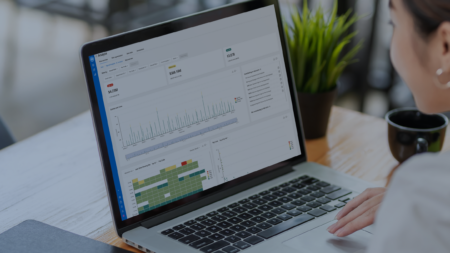The evolving CFO: from finance leader to enterprise architect
Today’s CFOs are no longer just the guardians of financial integrity—they are the architects of enterprise strategy, operational excellence, and digital transformation. As the most trusted C-suite executive, CFOs must balance strategic growth with cost efficiency while ensuring effective capital allocation. However, their ability to execute is hindered by a fragmented enterprise landscape:
- Siloed data and disparate systems make decision-making slow and unreliable.
- Data volume is doubling every two years, overwhelming finance teams.
- Lack of cross-functional collaboration leads to inefficiencies.
- Decentralized IT landscapes with thousands of tools create a costly, complex ecosystem.
- Aging control environments fail to address modern risks, leaving organizations vulnerable.
CFOs are hiring top talent to drive future-ready strategies, yet many leaders find themselves stuck managing legacy processes. They toggle between dozens of applications just to complete basic tasks. The result? A staggering 97 cents on a dollar is spent on maintaining the status quo, while 3 cents drive innovation. Meanwhile, boards and investors demand up to 40% cost reductions in finance operations.
To thrive, CFOs must embrace AI-driven solutions that deliver continuous insights and hyper-automation at scale. Enter the solution: an AI-powered Centralized Insights Factory—a game-changing approach to finance that transforms data into strategic advantage.
Why traditional data analytics fall short
Legacy data strategies rely on data warehouses, ETL pipelines, and manual training—a time-consuming and expensive approach that can take years before yielding ROI. Worse, these models can only detect known risks, meaning 90% of enterprise threats remain hidden.
Traditional AI models also introduce bias, reinforcing faulty processes and blind spots in the organization. They require vast amounts of labeled data, which is both costly and slow to collect.
The power of Unsupervised Machine Learning
AI has evolved beyond rule-based analytics. Unsupervised Machine Learning (UML)—especially when powered by domain-specific Ensemble AI—can revolutionize CFO decision-making.
- No need for expensive data warehouses or training—AI can analyze structured and unstructured data on the fly.
- Detects unknown unknowns—AI doesn’t just automate existing processes; it discovers inefficiencies, risks, and anomalies that humans might miss.
- Eliminates false positives and false negatives—reducing alert fatigue and improving accuracy.
- Keeps enterprise data private—avoid intellectual property conflicts, and hallucinations while ensuring security by working within a company’s own ecosystem.
Three game-changing outcomes for CFOs
An AI-powered Centralized Insights Factory empowers finance leaders in three critical ways:
1. Known error detection
CFOs need to stay ahead of known risks. AI can proactively identify and mitigate common errors such as:
- Duplicate payments and fraudulent transactions.
- Manual entry errors in reconciliations and ledgers.
- Compliance violations that trigger costly penalties.
By catching these issues in real time, finance teams can prevent revenue leakage and drive efficiency.
2. Uncovering unknown unknowns
The real power of AI lies in its ability to detect hidden risks and inefficiencies.
- Fraudulent invoices with manipulated rates or splits to avoid approvals.
- Cash flow bottlenecks caused by inefficient process cycles.
- Suboptimal or broken processes leading to cost overruns.
Unlike traditional analytics, AI uncovers patterns that humans miss, allowing CFOs to proactively address risks before they escalate.
3. Continuous auditing & autonomous finance
Legacy financial controls are reactive, relying on periodic audits that fail to capture real-time anomalies. AI enables a shift from continuous monitoring to true continuous auditing by:
- Retiring redundant point solutions, reducing IT costs.
- Automating compliance checks, saving thousands of hours.
- Optimizing workforce allocation, freeing up resources for strategic initiatives.
This shift redefines financial governance, making CFOs more agile and audit-ready at all times.
Building a unified, AI-driven enterprise
A recent Gartner survey found that 76% of CFOs are now responsible for their company’s data analytics and decision management strategy. To succeed, finance leaders must integrate AI into the broader enterprise.
Key pillars of an AI-powered Central Insights Factory:
1. Unified data strategy
CFOs must break down silos by integrating financial and non-financial data. A “pristine sheet of glass” approach—leveraging data connectivity or data lakes like Databricks or Snowflake—ensures continuous data integrity and accessibility.
2. A connected view of the enterprise
AI must go beyond General Ledgers and analyze sub-ledgers (AP, AR, T&E, Payroll), supplier systems, and unstructured data for holistic insights.
3. Seamless workflow integration
Insights must translate into action. AI-driven analytics should integrate directly into enterprise workflows, ensuring that the right people get the right insights at the right time to drive impact.
4. Change management and upskilling
AI is only as effective as the people who use it. CFOs must lead the charge in:
- Upskilling teams to embrace AI-driven insights.
- Eliminating siloed divisions across finance, risk, and operations for end-to-end process optimization.
- Transitioning from traditional finance operations to a centralized AI-powered model.
The future: CFOs as AI-driven enterprise leaders
The CFO’s role is no longer about just balancing books—it’s about architecting a lean, intelligent, and autonomous enterprise. AI-powered insights will drive:
- Faster, smarter decision-making.
- Tangible and measurable cost savings through process automation.
- Real-time risk detection and mitigation.
- Enterprise-wide collaboration between finance, operations, and technology.
With an AI-powered Central Insights Factory, CFOs can finally break free from legacy constraints and lead the transformation of their enterprises. The future belongs to finance leaders who embrace AI—not just as a tool, but as the backbone of their strategy.
Are you ready to build yours? Take the next step—schedule a chat with our experts and see MindBridge in action.

As the Chief Growth Officer of MindBridge, Karthik leads the company’s efforts in customer and partner ecosystem development. Karthik brings to MindBridge more than 20 years of international management experience with technology leaders such as SAP and DELL EMC. Karthik has a proven track record of driving rapid innovation and bottom-line growth. Previously, as EVP of Global Sales at Kyriba, he built and managed a team that tripled global revenues. Karthik holds a Master of Business Administration from Purdue University’s Daniels School of Business and an International Master of Management from ESCP Business School.





